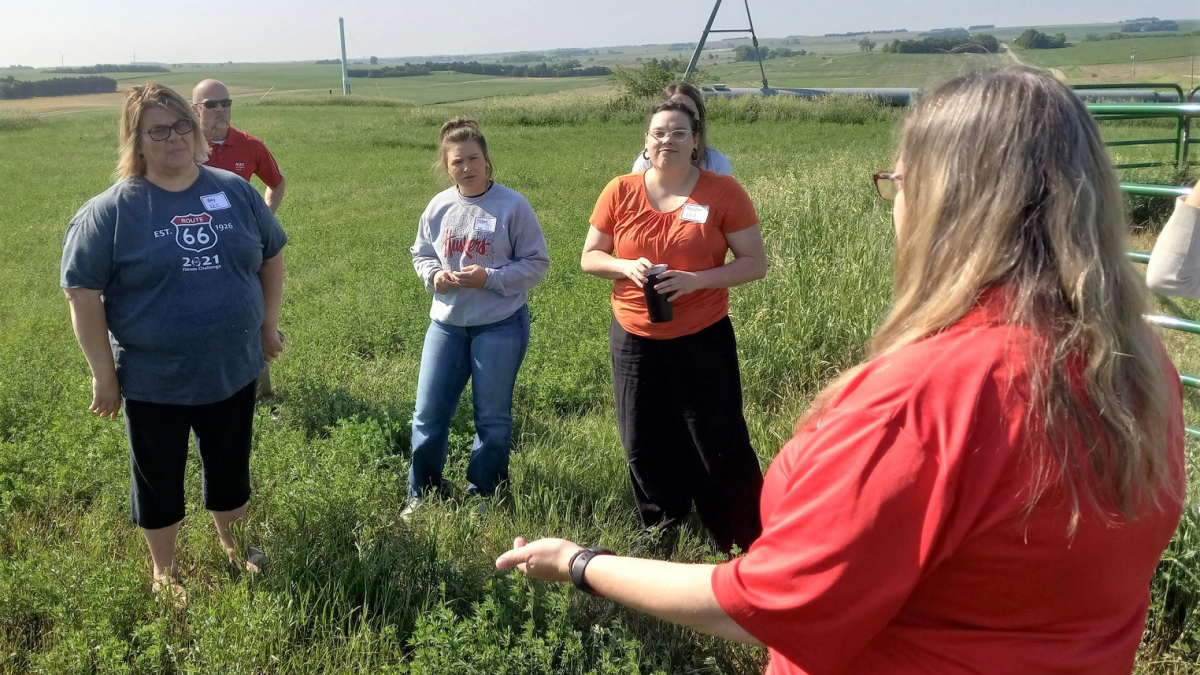by Geitner Simmons | IANR Media

Northeast Nebraska teachers visiting the Haskell Agricultural Laboratory this month learned that the 550-acre site is full of learning opportunities for students.
The arboretum at the Haskell site, part of the University of Nebraska–Lincoln’s network of ag research centers around the state, can help children learn identification and biology for trees and plants. The beehives and pollinator gardens illustrate the interactions of insects and plants. The sweeping fields of corn and soybeans are prime sites to learn about everything from basic horticulture to soil conservation and nitrate management.
The lab’s Mesonet weather monitoring system can provide a starting point to explain meteorology, climate science and environmental management. And the range of ag equipment, from tractors to sensors to drones, can be of great interest for mechanically inclined students.
Teachers from northeast Nebraska school districts gathered at the Haskell Ag Lab, 15 miles north of Wayne, as the latest step in strategic planning by the Northeast Nebraska Agricultural Science and Natural Resources Education Compact. That partnership, created in 2019 and expanding in membership in 2022, involves a range of the region’s school districts, educational service units and higher education institutions including Nebraska’s College of Agricultural Sciences and Natural Resources.
Haskell “is the perfect spot to do a lot of those things that we strive for,” Amy Hall, a teacher with Laurel-Concord-Coleridge Public Schools, said during the compact’s June 12 teacher summit at the ag lab. She cited the example of a honeybee event she holds to teach students about bee behavior and science.
“It would be fun for the kids to come out in the spring” to Haskell, she said, “and see all the different wildflowers and what impact they have on the honeybees.”
Brainstorming during the June 12 planning session showed the encouraging potential for future educational collaboration, said Meaghan Vollers, another teacher with Laurel-Concord-Coleridge Public Schools.
“I think that there is a great potential to bring science in a realistic way to students,” she said, “not only agri-science but biological sciences and environmental sciences, even physical science, so that students can explore this in a tangible way and excite that interest in learning.”
[media:2]
Participants in the teacher summit included representatives from CASNR, Nebraska Extension, Haskell and the university’s Agricultural Leadership, Education and Communication Department. Tammy Mittelstet, CASNR’s statewide education and career pathways coordinator, explained online assets, including a comprehensive CASNR newsletter, to inform teachers about educational resources and events.
The precision agriculture program at Northeast Community College in Norfolk is a helpful information source, said Mittelstet, the northeast compact’s coordinator. The college’s precision ag instructor, Courtney Nelson, provides online information including lesson plans and related material on precision agriculture. She also uses a mobile classroom for outreach to schools in the northeast region.
Teachers’ discussions generated an array of ideas for additional educational possibilities at Haskell, including help with greenhouses; hosting high school students to discuss data they collected on their crop plots; and creating a soil pit for land-judging practices and support with coaching.
Mini-classes on water sampling, nitrate application, farm-to-table concepts and the mechanics of farm equipment are another possibility. So is creating STEM learning initiatives where students can come to Haskell on a monthly basis to check ongoing projects such as decomposition of a pumpkin or the composting process.
The compact promotes students’ career exploration. One tool discussed is creating videos of different careers at Haskell and other research sites.
The compact’s original membership from 2019 consisted of CASNR, Little Priest Tribal College, Nebraska College of Technical Agriculture, Nebraska Indian Community College, Northeast Community College, Wayne Community Schools and Wayne State College.
In March 2022, the compact’s membership expanded to include Educational Service Units 1, 7 and 8 along with these school districts: Ainsworth, Allen, Battle Creek, Boone Central, Crofton, Elkhorn Valley, Emerson-Hubbard, Homer, Laurel-Concord-Coleridge, Neligh-Oakdale, O’Neill, Ponca, South Sioux City, Stanton, Summerland, Umonhon Nation, Walthill, Winnebago, Winside and Wisner-Pilger.
The next steps for the compact will be meetings of the compact membership via Zoom on Sept. 12 and Nov. 14.